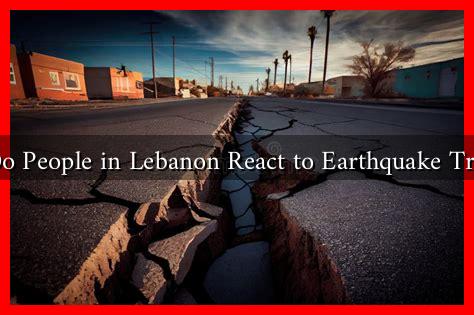-
Table of Contents
How Do People in Lebanon React to Earthquake Tremors?
Lebanon, a country situated along the eastern Mediterranean, is no stranger to seismic activity. Its geographical location places it near the boundary of the Arabian and Eurasian tectonic plates, making it susceptible to earthquakes. Understanding how the Lebanese population reacts to earthquake tremors is crucial, not only for disaster preparedness but also for fostering a culture of resilience. This article explores the various responses of people in Lebanon to earthquake tremors, examining historical context, psychological reactions, and community preparedness.
The Historical Context of Earthquakes in Lebanon
Lebanon has experienced several significant earthquakes throughout its history. Notable events include:
- 1759 Earthquake: This earthquake, which struck the city of Beirut, is estimated to have caused thousands of deaths and significant destruction.
- 1999 Earthquake: A tremor measuring 5.2 on the Richter scale shook the region, leading to widespread panic but minimal damage.
- 2023 Earthquake: A recent tremor felt across Lebanon reminded residents of the potential dangers, prompting discussions about preparedness.
These historical events have shaped the collective memory of the Lebanese people, influencing their reactions to subsequent tremors.
Immediate Reactions to Earthquake Tremors
When an earthquake tremor occurs, the immediate reactions of the Lebanese population can vary widely based on individual experiences, age, and location.
. Common responses include:
- Panic and Fear: Many people instinctively react with fear, leading to chaotic scenes as individuals rush to evacuate buildings.
- Seeking Shelter: Some individuals may instinctively seek shelter under sturdy furniture or in doorways, following safety protocols.
- Communication: People often reach out to family and friends via phone or social media to check on their safety and share information.
For instance, during the 2023 earthquake, social media platforms were flooded with posts from individuals sharing their experiences and checking on loved ones, highlighting the role of technology in crisis communication.
Psychological Impact of Earthquake Tremors
The psychological impact of earthquakes can be profound. Many Lebanese citizens experience:
- Post-Traumatic Stress: Individuals who have experienced significant earthquakes may develop PTSD, leading to anxiety and fear of future tremors.
- Community Solidarity: In the aftermath of tremors, communities often come together to support one another, fostering a sense of solidarity.
- Preparedness Initiatives: Increased awareness often leads to community-led initiatives aimed at educating residents about earthquake preparedness.
For example, local NGOs and government agencies have organized workshops and drills to educate citizens on how to respond effectively during an earthquake.
Community Preparedness and Resilience
In response to the threat of earthquakes, various organizations in Lebanon have taken steps to enhance community preparedness. Key initiatives include:
- Educational Programs: Schools and community centers often host workshops on earthquake safety and preparedness.
- Emergency Response Training: Local authorities conduct training sessions for first responders and volunteers to ensure effective disaster response.
- Infrastructure Improvements: Efforts are being made to retrofit older buildings to withstand seismic activity better.
These initiatives are crucial in building a culture of resilience among the Lebanese population, enabling them to respond more effectively to future tremors.
Conclusion
Lebanon’s geographical location makes it vulnerable to earthquakes, and the reactions of its people to tremors are shaped by historical experiences, psychological factors, and community preparedness efforts. While immediate reactions often include panic and fear, there is a growing awareness of the importance of preparedness and resilience. By fostering a culture of education and community support, Lebanon can better equip its citizens to face the challenges posed by seismic activity. As the country continues to navigate its seismic landscape, the lessons learned from past experiences will be invaluable in shaping a safer future.
For more information on earthquake preparedness, you can visit the Ready.gov Earthquakes website.





